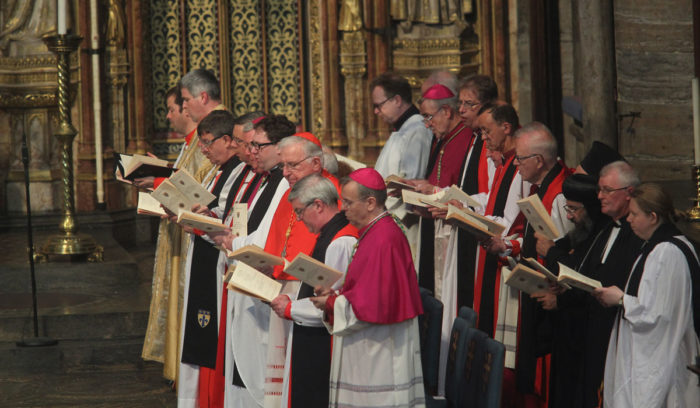16th June 2016
Disruptive dialogue


An important event I attended this week was a service at Westminster Abbey to mark the fiftieth anniversary of the Anglican Centre in Rome. The Dean was joined by the Archbishop of Canterbury and a range of ecumenical guests from Rome and the Catholic Church, from Orthodox and Methodist churches, and including the Pope’s Secretary for Christian Unity, Bishop Brian Farrell.
We are used to such ecumenical occasions. But we should never take them for granted. In a thoughtful speech later that evening at Lambeth Palace, Bishop Farrell – who is of Irish origin – reminded the gathering of just how “new” good relations between Christian churches are. As an 8 year old boy, a few years before the second Vatican Council and the establishment of the Anglican Centre in Rome, he recalled being roundly told off for allowing a friend, who happened to be Protestant, to come in to see his parish Church. I can remember casual anti-Catholic prejudice from my own childhood (I am Anglican). And we still live with sectarian hostility even today in parts of the British isles.
Which is why it is so important not to become complacent. The focus of much attention at state and faith level now is on relations between different religions – Islam, Judaism, Christianity. This is right, reflecting the vital importance for our increasingly multinational and multiethnic societies of understanding across religious boundaries. But given the challenge of Christian unity still remains after 50 years of dialogue, we should approach the inter-religious task with some humility. Bishop Farrell said that dialogue should not be comfortable, but also provocative and disruptive. I think he’s correct. Otherwise, it risks being superficial. Cosy, but achieving little. In the Archbishop of Canterbury’s phrase, it needs at all times to retain “the prophetic edge”.
So if the Anglican Centre in Rome provides a little of the grit in the oyster, that’s all to the good. It’s a useful lesson for all of us involved in dialogue with those of different views, including at the diplomatic level. We can celebrate 50 years. But we must keep talking. Let’s not pretend that discrimination, misunderstanding and prejudice have gone away. In all walks of life, we still need the “disruption” and “prophetic edge” that honest, respectful and robust dialogue provides.
Thank you, Ambassador, for these insightful comments on marking the 50th anniversary of the Anglican Center in Rome held in London. Appreciated also, affinity of your comments with a situation in other churches today. Bishop Farrell’s intervention sounds very interesting. We pray the Holy Spirit blows away ‘disruptive’ spirit among the Christians.